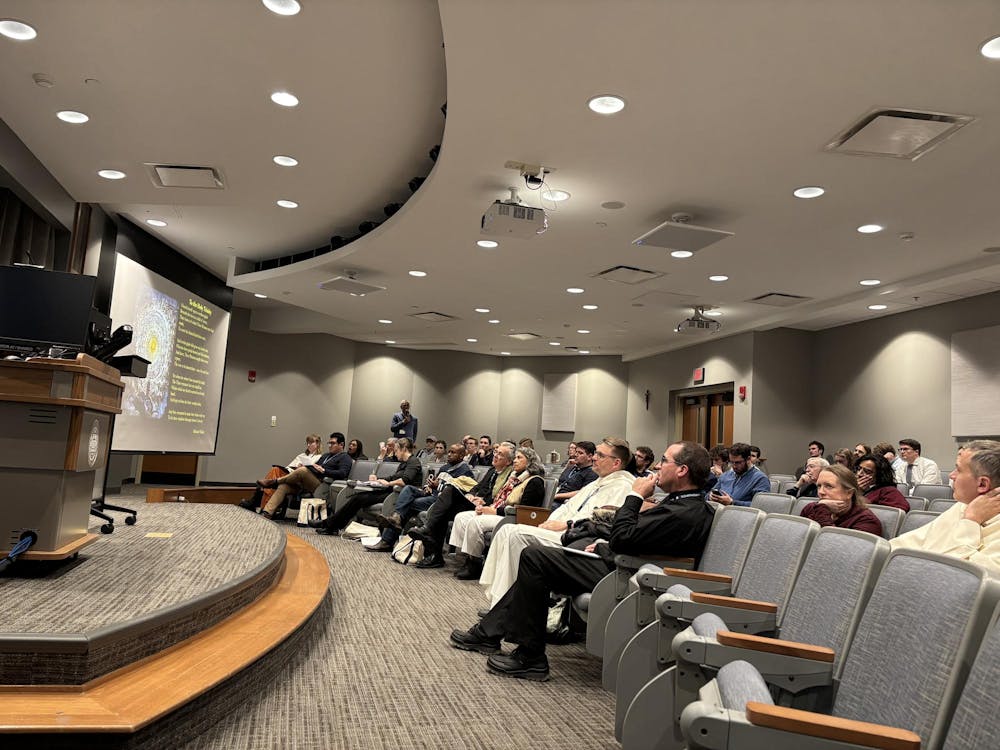The question of whether nothingness is somethingness was just one of the many questions discussed in this year’s Organs and Christianity Conference Series. Last Friday and Saturday, the McGrath Institute for Church Life hosted a two-day conference that invited scientists, philosophers and theologians to discuss the universe and meaning of existence. Notably, the lecture was meant to provide a foundation for discussions over the interconnectedness between modern science and theology.
The event featured a series of lectures from six professors specializing in the sciences and theology from Notre Dame and other academic institutions. In addition to the main lectures, John Cavadini, the institute’s director, and Santiago Schnell, dean of the College of Science, provided complementary remarks.
Emeritus professor of physics at the University of Delaware and president of the Society of Catholic Scientists, Stephen Barr, began the conference with a talk on the origin of matter. His talk introduced fundamental theories that underlie the universe to the audience; particle interactions and matter-antimatter asymmetry were among topics discussed.
At the conclusion of his talk, Barr discussed the deep unsolved problems that still exist in fundamental physics while discussing concepts such as dark energy. During the Q&A session, a number of audience members expressed a sense of ineffability and mystery in regard to complex topics such as dark matter. Barr responded to their questions with his own interpretation of science and human existence.
“I think matter is a lot simpler than a human being, which is why the hard sciences are actually relatively easy,” Barr said. “You can write down equations, and the matter just goes along and follows the equation.”
“The physical world is relatively simple. As I said, the real mysteries have to do with the divine soul, love, goodness and evil. Physics is a simple subject for simple souls,” Barr continued.
With this beginning lecture on existence as explained through physics, the conference continued the next day with a series of other topics diving deeper into the subject of science and humanity. Luc Jaeger, chemistry and biochemistry professor at the University of California Santa Barbara, Kieran McNulty, ecology, evolution and behavior professor at the University of Minnesota and Mariusz Tabaczek, theology professor at the Pontifical University of St. Thomas Aquinas, delivered the next three talks focused more specifically on the origin of the human species and life.
“God is love, not in the oneness of a single person, but in the Trinity of one substance,” Baglow explained. “He does not live in splendid solitude but rather is an inexhaustible source of life that is ceaselessly given and communicated to a certain extent.”
“We can perceive this by observing both the macro universe, our Earth, the planets, the stars, the galaxies and the micro universe. The name of the Blessed Trinity is, in a certain sense, imprinted upon all things … In this way, we catch a glimpse of God as a relationship and ultimately creator love,” Baglow continued.
Following Baglow’s lecture, audience members posed questions in response to the talk’s focus on God and physical existence. One speaker in particular asked about the mystery of existence and the necessity of God’s existence. In addition to Baglow, a series of other audience members spoke up to respond to this existential question.
“One way of approaching it is to say that if one believes that all things are intelligible, then one can argue that there must be some act of understanding,” an audience member said. “The complete intelligibility of reality is somewhat argued that there must exist an act of understanding, and that act of understanding would necessarily be infinite. [God] is the unrestricted act of understanding.”
Other questions delved deeper into more philosophical discussions over topics such as nothingness, Genesis 1 and Saint Aquinas’ own definition of Creation. At the conclusion of this final lecture talk, Baglow further emphasized the interconnectedness between human existence, creation and theology.
“Christ gifted Himself on the cross; that's the heart of the meaning of the existence, of all things from a Christian perspective,” Baglow said. “It is the very same mercy intensely expressed in His agony and death that we see in the fact that each and every one of us exists and has our being which we did not give ourselves.”










